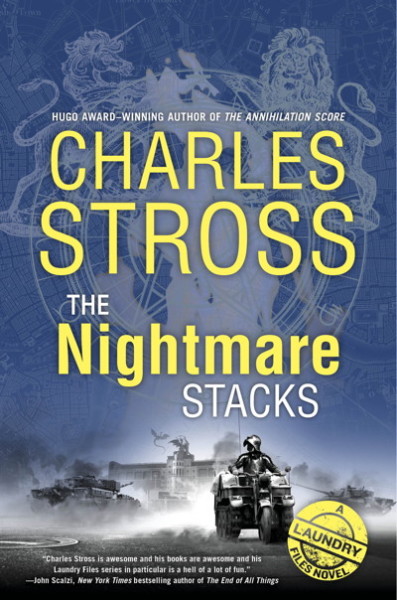
The Nightmare Stacks (UK edition)

The Nightmare Stacks (North American edition)
The next book in the Charles Stross “Laundry Files” series will be
The Nightmare Stacks, to be released in June, 2016. There are two versions of the cover because Charles has different publishers for the UK and North American markets. This novel will not feature either Bob Howard or Mo (who featured in the most recent book
The Annihilation Score), as Charles explains in the interview linked below. If you haven’t discovered the “Laundry” series, you’re missing a treat. Start with
The Atrocity Archives and discover what happens when you mix secret agents and espionage with mind-numbing horrors from the Cthulhu mythos. Highly recommended.
Charlie Jane Anders talked to Charles about the book and the series:
How has the Laundry Files series changed and evolved in the dozen years or so that you’ve been writing it? Are there elements that you’re still surprised became so prominent?
I’ve been writing the Laundry Files series for 16 years at this point. When I began, I intended the short novel “The Atrocity Archive” (published with “The Concrete Jungle” in the book The Atrocity Archives — note the plural!) as a one-shot. It was only a few years later, when people began asking for more, that I had any idea of writing a sequel, and only with the third book, 8 years in, that I realized I needed a Plan. And because the book’s narrator, Bob, had been aging in line with the real world as I wrote the first three books, the most obvious plan was: track Bob’s career as he grows older, more senior, and more cynical.
This turned out to be a really fortuitous choice. It allowed me to fix some minor inconsistencies in the earlier books; because they’re Bob’s workplace memoir, he often gets the wrong end of the stick at first then learns better about some aspect of the job over time. It also allowed me to deepen him as a character, adding complexity to the narrative as he ages and possibly becomes more self-aware (although he doesn’t really have to grow up until books 8 or 9).
What I really wasn’t expecting was that Bob’s life would take over — and that the most important events in it would end up taking place off-screen, so far off-screen that I needed to pick new narrative voices! His wife Mo, for example, exhibits a very unvarnished perspective on Bob’s seemingly bottomless reserves of self-delusion in The Annihilation Score, and demonstrates that the series is very much about the Laundry as an organization, rather than just being Tales of Bob. And in The Nightmare Stacks I had to leave Bob behind entirely in order to give a worm’s eye view of the start of events that will give rise (eventually) to the climax of the series.
This book features a new character, Alex, instead of Bob. What’s the reason for switching focus?
In The Atrocity Archives Bob starts out as a twenty-something tech support guy who has blundered into a Len Deighton spy thriller (with added tentacles). By the start of The Rhesus Chart, Bob has leveled up so far that he can wade into a nest of vampires — admittedly rather inexperienced vampires — and escape with mildly damaged dignity and a stack of paperwork. Power-ups are a constant problem for any multi-book series that riffs off the Hero’s Journey: how do you engage with the underdog when your protagonist has risen from Midshipman to Admiral of the Fleet?
Alex is in some ways not dissimilar to Bob in his early incarnation. There are drastic differences: Alex has powers of his own — although they come at a drastic price. But Alex takes us back to the guy who gets sent to fix the cabling rather than spending all his time in policy meetings. And he’s got a young guy’s problems and social anxieties, unlike Bob (who by this point is in his early forties).

 Adrian Peterson was the engine that kept Minnesota in this game (29 carries for 158 yards and two touchdowns) … with more than a bit of help from a stout defence that didn’t give up a touchdown until the final two minutes. Atlanta committed enough mistakes to cripple their own scoring chances, including a Terence Newman interception in the Vikings end zone.
Adrian Peterson was the engine that kept Minnesota in this game (29 carries for 158 yards and two touchdowns) … with more than a bit of help from a stout defence that didn’t give up a touchdown until the final two minutes. Atlanta committed enough mistakes to cripple their own scoring chances, including a Terence Newman interception in the Vikings end zone.



